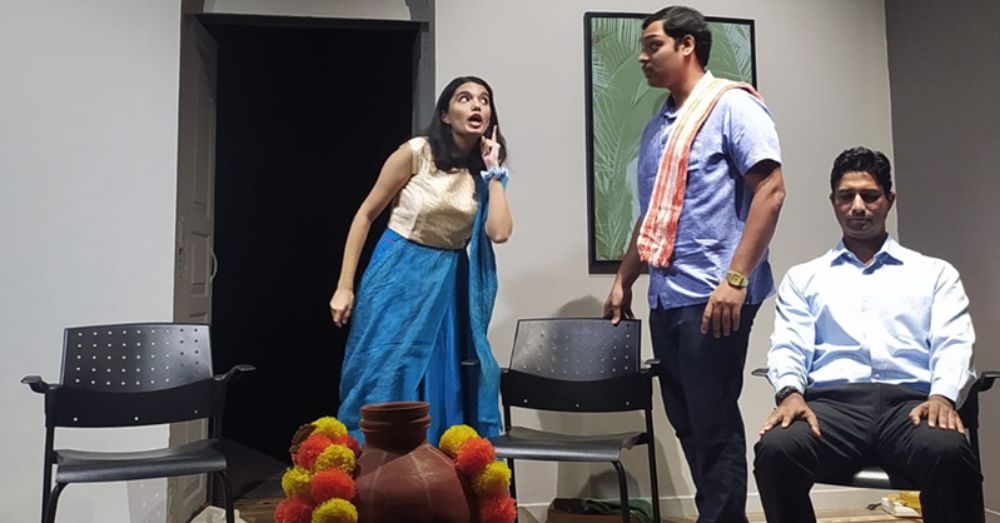Each of us shares a unique connection with water. To me, water brings back memories of sipping cool well-drawn water stored in gurguleta, enjoying the raindrops on my head, and taking a dip in a spring at the peak of summer. But for many, water brings pain. It can mean waiting in long lines with buckets or losing a loved one in a manmade water disaster.
Goa’s The Mustard Seed Art Company makes water the central theme of its latest theatre production, “Who Stole The Water?”, spotlighting these intimate diverse narratives. The play, set in a Goan village craftily explores diverse water stories, and their inter-connectedness.
(Performance of “Who Stole The Water?” at Sunaparanta Goa Centre for the Arts, Panjim featuring
(L to R) Priyanka Pandit, Jeff D’Cruz, Rohan Olegario Nazareth, Kiran Bhandari, Stuti Gaitonde)
Here’s a peek at the characters who bring water (or lack of it) to life.
Posrokar (shopkeeper) Umesh, son of a water diviner, sees his late father in his dreams as the water scarcity in his village escalates. His neighbour Divya, is a chatty homemaker, whose spouse is a water-obsessed scientist away on a maritime mission. Divya agrees to let Umesh dig a well in her backyard. But first, she must secure a license (yes, you need a license by the law).
Preeti, a lifeguard, has many romantic notions about water. It gets her adrenaline pumping and even nudges her to be a creative problem-solver. Her buddy Dwarkanath, a student of law, journeys through life with grief. Having lost a loved one to floods caused by a manmade dam, he develops a disdain for water. But can his lawyer chops be useful in a water crisis?
The fifth character in the water matrix is Babu Sir, the local politico who runs a water tanker business (but of course!). The strategic demise of local wells fuels his business. Rumour has it that his wife jumped in a well to escape a life with him. Or perhaps she has run off with a member of the opposition. Divya’s quest for a well-digging license triggers his scorn.
As water scarcity grows in the village, the lives of all five characters collide, in an entertaining turn of events. With spirited performances by the cast, and a simple, yet, striking set, the play is a commentary on the state of water in Goa, a land naturally blessed with sea, rivers, tributaries, and springs. References are made to real-life water crises like the one in Mendes Vaddo, Arpora, where a pipeline blockage left 40 households with no water for several days and the tanker-dependent villagers of Corgao who are shelling out a pretty penny for the most basic of human needs.
Yes, all’s not cheerful and well in Goa, though there was a time when we drank water from wells and swam in the sweet, clean water of springs, and the ocean. In the play, Umesh, an aspiring water diviner, makes a heartbreaking reference to how unsustainable developers destroyed a water-rich well dug by his father, which served the entire village. “They filled it and killed it, and built those flats upon flats, on its sorrowful grave,” he proclaims. Today, Goa’s wells, rivers, and springs are running dry.
The script also references the hastily conceived fatalistic plan to hijack water from Goa’s Mhadai river and divert it to Karnataka. Travelling 76 km in Goa, the river is considered to be a lifeline in the state. It nourishes wildlife ecosystems, balances the water salinity of Khazan farmlands, and provides drinking water to 43% of Goa’s population before it exits into the sea.
So, from a land of water abundance, we are en route to becoming a culture of water tankers, a place where women will make back-breaking journeys in search of water.
These scenes, rampant in many parts of the country, are nothing less than heart-breaking.
Who Stole The Water, written and co-directed by Isabel de Santa Rita Vás and Kiran Bhandari, gently nudges Goans to get more invested in the fate of future water access. One of the key messages is that knowledge can be a powerful weapon in this journey.
Cast member Stuti shared that the cast and crew were encouraged to learn more about Goa’s water history and current water realities, months before performing on stage. A playful scene has the characters quizzing each other on Goan water facts.
“How many rivers do we have in Goa? 11 rivers and 43 tributaries.” “Where does the Mandovi start and where does it flow? It originates at the springs at Bhimgad and flows through Karnataka and Maharashtra and Goa.” “Which is the new river that has been discovered in Canacona? The Vakdi River!” “Why should the Mandovi not be diverted from Goa as is planned? Because God gave it to us!”
(On the far right, Isabel de Santa Rita Vás, writer and director of “Who Stole The Water”)
As I left the theatre, the lyrics of “Sing to the water”, a poignant original song by cast member Jeff D’Cruz, resonated in my mind. Inspiring Goan water pride, the lyrics are accompanied by a subtle warning…
“Here we come to sing and dance, To drink to the source of life, Touch and stir the waters of love, We dream of rice and coconut trees. Our histories and the prayers we say, Sing of fish and nets, May they increase, Steal the waters and you will pay.”
The Mustard Seed Art Company has performed original plays inspired by Goa for over 35 years. Don’t miss the latest performance of “Who Stole The Water” on December 6, 2023, at Goa University, presented as part of the Multidisciplinary Cluster on Mhadai. The performance is open to all.
